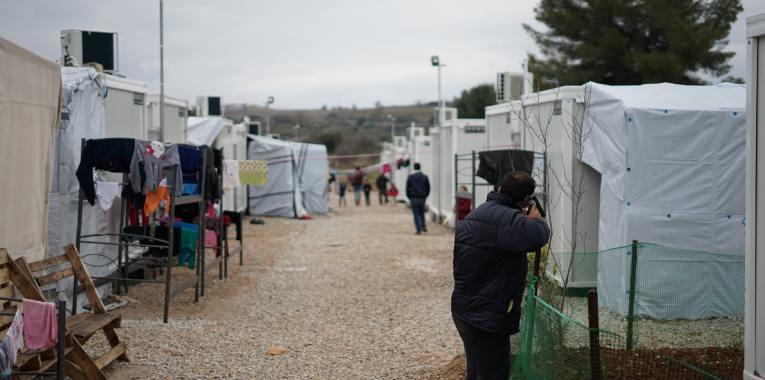The narrative regarding refugees and migrants has often been couched in negative terms, which has led in turn to the isolation of such individuals. This is partly a cause of the criminalisation of migrants perpetuated in the media, leading to xenophobia and racism, or top-down policies that do not take into account lived realities. This is clearly evident in the case of the EU-Turkey deal of 2016 – an agreement to discourage refugees from seeking asylum in Europe. It allowed Greece to send incoming ‘irregular migrants’ to Turkey instead – the latter would increase measures to stop illegal migration and would in exchange receive €6 billion in aid from the EU for its migrant communities; the agreement also included the possibility of resettling of one Syrian refugee in the EU for every one that Turkey let in. It is clear that this agreement is a political strategy benefiting EU countries at the expense of refugees’ rights, and despite being heavily criticised as such, it was still pushed forward.
Turkey had essentially taken on the heavy burden of becoming Europe’s new buffer zone. The toll of this was not fully realised until February 2020 when Turkish authorities announced the reopening of the border shared with Greece amid accusations that the EU had not provided Turkey with the promised funding to support 3.6 million refugees within its borders. Following this, hundreds of refugee communities in the country rushed towards the border with the hopes of gaining entry into Europe, and according to interviews conducted on the ground by Amnesty International representatives, there were free buses ready to transport them to the border region. This political move to pressure the EU into more cooperation once again came at the expense of these migrants flooding the border, where they were pushed back violently by the Greek border security.
These tensions laid the foundations on which the Greek Migration Minister, Notis Mitarakis, introduced the most recent migration legislation aimed at accelerating deportations. Following this law, which has led to an increase in deportations, Greece’s new stance on migration has been under intense international scrutiny due to several concerning clauses justifying heavily militarizing the border, detaining migrants in extremely poor conditions, drastically reducing the grace period for voluntary deportations from 30 days to as little as a week, and granting border police the right to deport migrants who were previously under the jurisdiction of migration authorities. Yet Mitarakis remains firm in his stance, reiterating that Greece will not be the ‘gateway’ to Europe. Experts in European Asylum Law, as well as human right NGOs like Amnesty International have stated that Greece’s tough policies were in blatant violation of international laws and humanitarian obligations – accusations which Mitarakis has categorically denied.
Greece faces two main challenges. First, turning back incoming refugees and migrants towards Turkey. The failure of the EU to properly maintain the conditions put forward in the EU-Turkey deal has resulted in this back and forth movement of human lives between the two countries. With sufficient evidence of the violence inflicted upon these communities by the border forces, the conditions in which they are detained, and the lack of access to basic protections, it is clear that their lives are treated only as political leverage by the Greek and Turkish governments. Secondly, Greece must brace for the impact of rapidly growing international attention towards its migration policy. The country has obtained an unprecedented amount of funding from the EU to handle its humanitarian crises since 2015. With very few positive results alongside policy and implementation gaps highlighted by the COVID-19 pandemic, there are concerns about whether these funds are being used productively.
The EU has created a dangerous migratory loop along with political tension between Turkey and Greece at the expense of displaced populations. The only productive way forward is recognising that refugees are human beings whose needs should be integrated at the core of migration policy instead of furthering political agendas.
By Parisa Omar
Paris is a final-year International Development student from Bangladesh. Her main interest lies in the political economy of public health – the intersection of social policy, global governance, politics, and public health outcomes. She is also looking forward to researching the health system and rights of vulnerable communities, particularly in developing countries and refugee populations.
Bibliography
Amnesty International. 2017. “A BLUEPRINT for DESPAIR HUMAN RIGHTS IMPACT of the EU-TURKEY DEAL.” https://reliefweb.int/sites/reliefweb.int/files/resources/EUR2556642017ENGLISH.PDF.
Amnesty International. 2020. “Document.” Www.amnesty.org. April 3, 2020. https://www.amnesty.org/en/documents/eur01/2077/2020/en/.
Amnesty International. 2021. “Greece: Pushbacks and Violence against Refugees and Migrants Are de Facto Border Policy.” Amnesty International. June 23, 2021. https://www.amnesty.org/en/latest/press-release/2021/06/greece-pushbacks-and-violence-against-refugees-and-migrants-are-de-facto-border-policy/.
Carrao, Ignazio. 2021. “LEGISLATIVE TRAIN 09.2021 8 towards a NEW POLICY on MIGRATION EU-TURKEY STATEMENT & ACTION PLAN [ ARRIVED ] CONTENT.”
European Commission. 2015. “Press Corner.” European Commission – European Commission. 2015. .
Fallon, Katy. 2021. “Greece Will Not Be ‘Gateway’ to Europe for Afghans Fleeing Taliban, Say Officials.” The Guardian. August 26, 2021. https://www.theguardian.com/global-development/2021/aug/26/greece-will-not-be-gateway-to-europe-for-afghans-fleeing-taliban-say-officials.
Human Rights Watch. 2021. “World Report 2021: Rights Trends in Greece.” Human Rights Watch. January 13, 2021. https://www.hrw.org/world-report/2021/country-chapters/greece.
Stevis-Gridneff, Matina. 2020. “Greece Suspends Asylum as Turkey Opens Gates for Migrants.” The New York Times, March 1, 2020, sec. World. https://www.nytimes.com/2020/03/01/world/europe/greece-migrants-border-turkey.html.
Tagaris, Karolina. 2021. “Feeling Abandoned by Europe, Greece Hardens Migration Policy.” Reuters. June 18, 2021. https://www.reuters.com/world/europe/feeling-abandoned-by-europe-greece-hardens-migration-policy-2021-06-18/.
TRT World. 2021. “How Greece’s New Asylum Policy Endangers Refugees and Violates EU Laws.” How Greece’s New Asylum Policy Endangers Refugees and Violates EU Laws. June 8, 2021. https://www.trtworld.com/magazine/how-greece-s-new-asylum-policy-endangers-refugees-and-violates-eu-laws-47357.
Utych, Stephen M. 2018. “How Dehumanization Influences Attitudes toward Immigrants.” Political Research Quarterly 71 (2): 440–52. https://www.jstor.org/stable/pdf/26600483.pdf.

